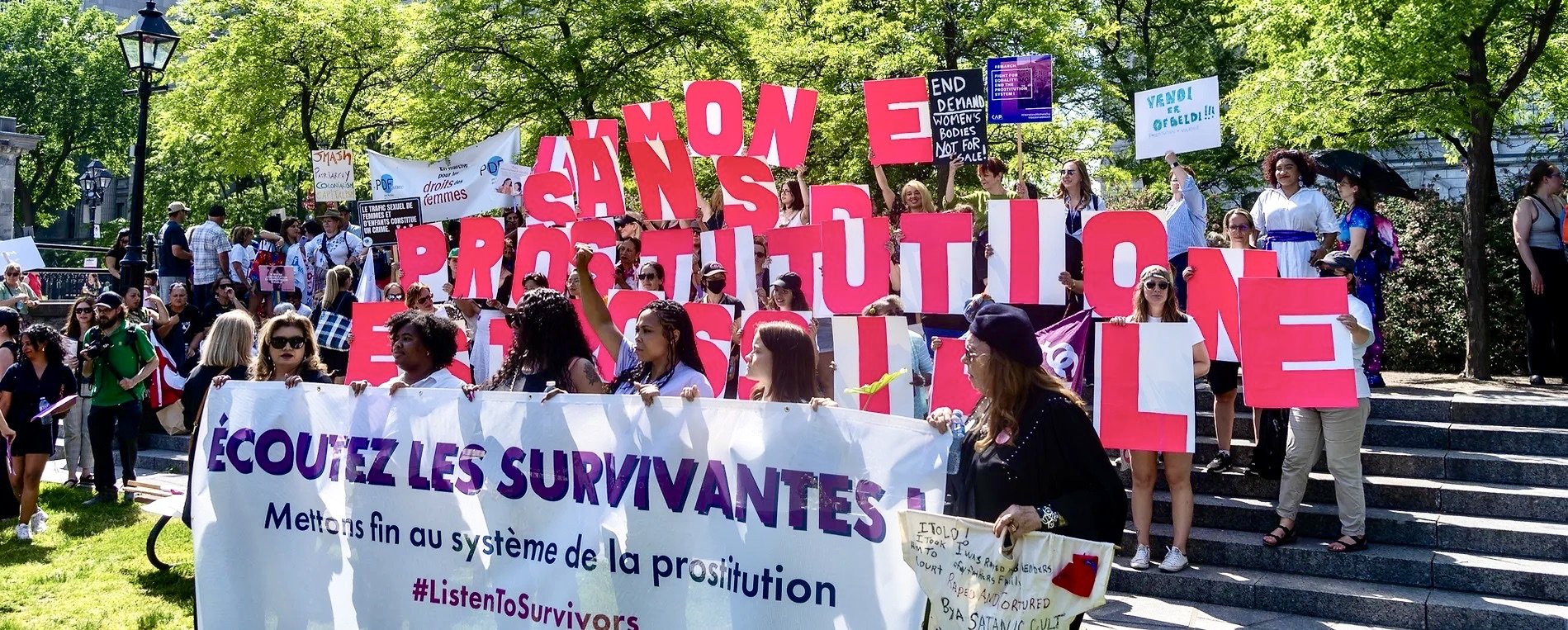Reflections on the 4th World Congress for the Abolition of Prostitution
This piece combines the reflections of FiLiA’s Anti-Prostitution Lead, Luba Fein, and FiLiA’s Spokeswoman, Raquel Rosario Sánchez, after they participated in the 4th World Congress for the Abolition of Prostitution.
The Congress was organised by CAP International, Canadian-based organisation La Cles, Breaking Free, the Vancouver Rape Relief and Women’s Shelter, and the EVA Centre. At the end of the Congress, the organisations jointly launched the Montreal’s Call for the Abolition of Prostitution, which is signed by more than 60 organisations.
Luba and Raquel
Luba’s Reflections
The 4th World Congress for the Abolition of Prostitution was held from 1st to 3rd June in Montreal, Canada, under the powerful slogan ‘Equality in Action!’. The event was an unforgettable experience.
The congress began with the Survivors’ March, a moving demonstration led by prostitution survivors with their allies following in support. The strength and pride of the marchers overshadowed the negligible counterprotest. The subsequent two days were filled with insightful panels featuring dozens of brilliant speakers, including prostitution survivors, support workers, researchers, journalists and more.
The indigenous activists from Canada discussed how the prostitution system continues historical oppressions. Renowned activists like Maria Dmitrieva from Ukraine, Noura Raad from the European Network of Migrant Women, and Susan Jay from Asian Women for Equality highlighted the intersectional nature of oppressions that vulnerable women face. Prominent survivors, such as Amelia Tiganus and Cherie Jimenez, passionately called for the abolition of prostitution. The UK-based journalist Julie Bindel pointed out the dangerous and misogynistic cooperation between the lobby of the supporters of the sex industry and the lobby of the supporters of gender ideology.
The UN Special Rapporteur on Violence Against Women and Girls, Reem Alsalem, presented her recently published report that courageously revealed the inherent violence of prostitution systems. Both the conference and Reem Alsalem’s report were timely and crucial, as sex trade lobbyists have long been promoting the normalisation of pimping and the framing of prostitution as legitimate work –both things the prostitution survivors can never accept.
During a workshop on the myths about prostitution, with Dr Melissa Farley and Dr Vednita Carter, I shared a prostitution survivors’ petition , the aim of which is to refute the widespread lies and emphasise that all systems of prostitution should be abolished:
‘Decriminalization of pimps and sex buyers does not benefit the survivors of prostitution, vulnerable individuals at risk of being prostituted, or society as a whole. Neither does the use of the misleading term “sex work”. No policymakers, public opinion leaders, lawmakers or self-proclaimed activists have the mandate to promote our exploiters and abusers. Not in our name!’
Raquel’s Reflections:
The 4th World Congress for the Abolition of Prostitution, held earlier this month in Montreal, Canada, provided a galvanising opportunity to reaffirm that the women’s liberation movement stands against all forms of male violence against women including, quite naturally, the inherent violence of the sex industry.
I was invited as a panellist to discuss prostitution and pornography as forms of violence against women. On a personal level, it felt like such a milestone to share the stage with thinkers and campaigners whose work has helped develop my own analysis over the years, including US theorist Catharine McKinnon, Canadian senator Julie Miville-Dechene, French advocate Lorraine Guestiaux, and Swedish campaigner Megan Donovan in a panel moderated by Canadian feminist Hilla Kerner from the Vancouver Rape Relief and Women’s Shelter. My speech focused on how sex buyers’ demand for ‘personalised pornography’ is the predecessor of more industrialised forms of exploitation, such as Only Fans.
In the past, men who paid for sex would talk about it with their closest friends or family members: only a very small number of trusted fellow men. But the online communities I research offer a non-judgmental space where men can find support and camaraderie with thousands of fellow sex buyers. There is very little bickering or abuse from men to fellow men. As opposed to the aggressiveness and degradation displayed towards women who they are paying for.
Something I explore in my research is the explicit request from sex buyers for what I call “personalised pornography”: that is to say, sex buyers oftentimes wanted to: a) take pictures or videos for the women, b) photograph or film themselves having sex with them and c) share and request videos of “their mates” in the online communities having sex with women in prostitution
We have long established the analysis that pornography is prostitution mediated via the lens of a camera, but we can equally make that argument the other way around. When a sex buyer coerces a woman to produce personalised pornography for him and then shares that content with his mates at the online community, then that personalised pornography gets passed onwards and onwards. Eventually probably ending up in pornography platforms and presented as “homemade” or “amateur” pornography. We can see then, that in this sense, the line separating prostitution and pornography is extremely slim… if it exists at all.
The abolishment of prostitution is exhausting work, but it felt refreshing to be amongst hundreds of people (overwhelmingly women) working around the world towards a shared goal. This struggle is led by victims and survivors of this forms of male violence. As always, there are newer challenges ahead on this long road, but there is also energy, commitment and sisterhood.
Petition
Luba Fein and sister abolitionists share this petition stating the clear reasons why prostitution and the sex industry must end. FiLiA is proud to host this and if you agree, as a survivor, ally or supporter, please sign.


